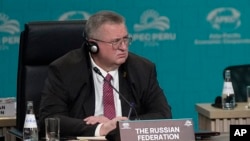Overchuk stepped up Moscow’s warnings about economic consequences of that geopolitical choice for Armenia during a panel discussion with his Armenian opposite number, Mher Grigorian, held as part of an annual economic forum in Saint Petersburg.
“Under the conditions formed between the Russian Federation and the European Union, Russian business understands that it has no prospects in Armenia because as things stand now, we have no prospect of interaction with the European Union,” he said. “It’s a fact. And this explains the ongoing drop in commercial exchange [between Russia and Armenia.]”
Overchuk said that Russian-Armenian trade, which has skyrocketed since the outbreak of the war in Ukraine, is now on track to contract by almost half, to less than $7 billion, this year.
Russia accounted for over 41 percent of Armenia’s foreign trade last year, compared with the EU’s 7.7 percent share.
Earlier this year, the Armenian government pushed through the parliament a bill declaring the “start of a process of Armenia's accession to the European Union.” Moscow has warned that the South Caucasus nation risks losing its tariff-free access to Russia’s vast market and having to pay much more for Russian natural gas and foodstuffs.
Prime Minister Nikol Pashinian and other Armenian officials have stressed the law does not amount to an EU membership bid. They have also said that Yerevan has no plans yet to leave the Eurasian Economic Union (EEU), a Russian-led trade bloc comprising five ex-Soviet states.
“But you’ve passed the law and we take it seriously,” countered Overchuk.
He said that Pashinian’s government is already introducing some EU standards for food imports to Armenia which run counter to the EEU’s relevant regulations
“We understand that these actions are aimed at creating conditions for diluting our existing relations. Unfortunately, it’s a very serious issue,” he said, hinting at retaliatory measures by Moscow.
Grigorian disagreed, saying that ordinary Russians continue to “feel great” in Armenia and that Overchuk is “somewhat dramatizing the situation.”
“I would say that Russian business also feels very comfortable in Armenia,” added the Armenian vice-premier.
Grigorian did not comment on his government’s EU aspirations that have not yet been officially welcomed by any of the bloc’s 27 member states.
Pashinian stated last week that Armenia will eventually have to choose between the EU and the Russian-led bloc. But he did not say when that could happen.
Pashinian and his entourage first floated the idea of an EU membership bid in early 2024 amid rising tensions with Moscow. Armenia’s mainstream opposition groups denounced the resulting drift to the EU as reckless and warned of its severe consequences for the domestic economy.




